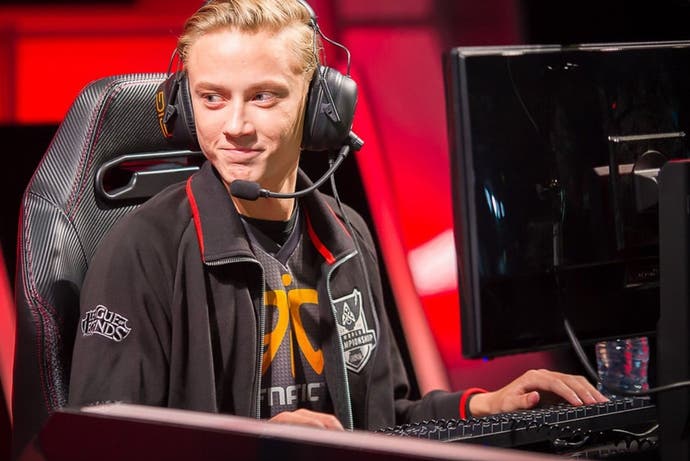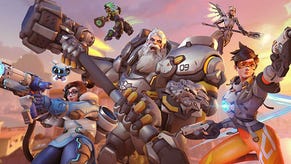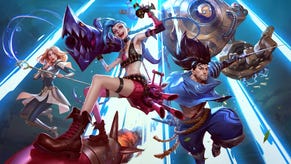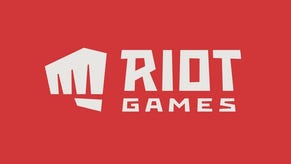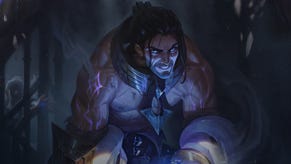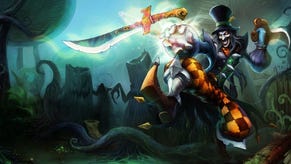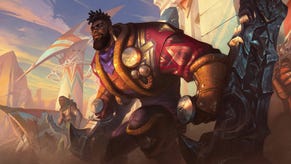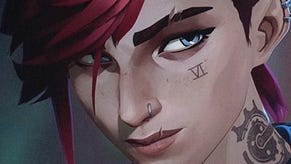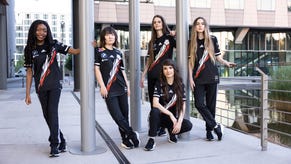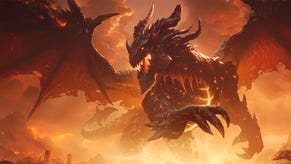The carry: The strange career of a League of Legends star
The fall and rise of Fnatic's Rekkles.
In the brief history of professional League of Legends, there might not be another European player who generated as much hype and excitement as Martin 'Rekkles' Larsson. When he debuted for Fnatic in 2014 - a proud eSports organization that predates League, and whose team won the first-ever LoL world title - it was supposed to the mark the start of a new era.
It had been a long time coming. Larsson's arrival was unusual in western eSports: he was one of the first players to be identified as a superstar well before he came of age. Fnatic had signed-him as early as 2012, and effectively played the entire 2013 season with a substitute at Rekkles' position. That's how good he was: in an eSport where teams rarely plan beyond the next three months, Fnatic invested years in Larsson.
Which made it all the more stunning when, in the space of a year, Rekkles went from the being treated as the cornerstone of Fnatic's future to being its selfish, spoiled traitor. Off of Summoner's Rift, the three-lane playing-field of League of Legends, Larsson showed a knack for saying the wrong thing and making the wrong move.
Larsson's early professional career was marked and marred by unpreparedness. He entered a League of Legends scene that was unprepared for a star player who acted like one, complete with self-interest and ambition. More dangerously, Larsson himself was unprepared for the scrutiny, pressure, and expectations that would accompany the start of his professional career. Things went so badly, in fact, that his pro career was in jeopardy less than a year after it began.
"People saw me as some kind of wonder child for two years straight," Rekkles says now. "People saw me on a very good side, if that makes sense. They considered me a good player, a good person, all that kind of stuff. The backlash that happened? I didn't expect it, and neither was I used to it."
Las Vegas, December 2012
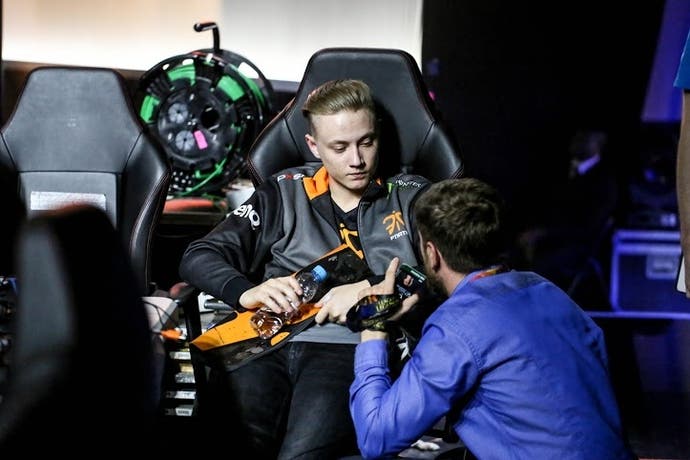
Rekkles' job, as he understood it, was killing people in League of Legends. When he burst on the international scene at IGN Proleague 5, he looked like he was better at that job than anyone else in the world.
The crowd watching Fnatic dismantle the reigning League of Legends world champions, the Taipei Assassins, sounded like they were watching a high-wire act in a circus. They would gasp and quieten down as the suspense built, and then explode into cheers and applause again as Fnatic pulled off the next highlight-reel moment.
Just a few months earlier, the Fnatic League of Legends team had been almost irrelevant, unable to qualify for the 2012 playoffs. Now, in a packed ballroom at the Cosmopolitan in Las Vegas, they looked untouchable.
A lot of it was thanks to Rekkles. As Fnatic's AD Carry, the player who controls the high damage-dealing heroes and whose job it is to gun-down opposing players, he seemed to be single-handedly killing off the entire enemy team. To the people watching in that ballroom, he might as well have been playing League of Legends one versus five.
With Rekkles, Fnatic seemed unstoppable, and for fans who had just watched Europe and America get bulldozed by Korean and Chinese teams (in a pattern that would become very familiar in the ensuing seasons), Rekkles seemed like the player who could put a western team back in contention for a championship.
"We absolutely need to find some way to keep him around."
I ran into Fnatic's Patrik 'cArn' Sättermon at the IPL 5 Shootmania tournament, where the former Counter-Strike star was bemusedly watching established FPS pros slogging through a dead-on-arrival competitive shooter. He had retired from Counter-Strike and was transitioning into a management role with Fnatic. I asked him about the future of the young League of Legends prospect, and he smiled.
"Yeah, we absolutely need to find some way to keep him around," he said. But there was a problem: Riot was in the process of turning League of Legends eSports professional, and bringing the European and North American scenes under their control. By and large, it was great news: the League of Legends Championship Series (LCS) would produce regular, high-quality broadcasts and create a clear progression from the regular season through to the world championship. They were establishing a minimum salary for players and financing their teams.
However, Riot was also imposing an age requirement, and Larsson was now too young to compete under Riot's new rules. Fnatic had found their ace prospect - and now they'd have to keep him on-ice for a year.
Despite a 2013 season that went exceedingly well for Fnatic, the team and its fans were always waiting for Rekkles. He spent the year dominating the challenger-tier of League of Legends, a superstar talent playing in lower-level leagues and tournaments. Even as Fnatic headed to Worlds, where they made it as far as the semi-finals, there was debate as to whether or not they should put Rekkles into the playoff lineup now that he was old enough to compete.
In a way, Fnatic's strong performance without Larsson only heightened the anticipation for his him. If Fnatic could do so well without their star rookie, they would be unbeatable once he joined them.
Reckless decisions
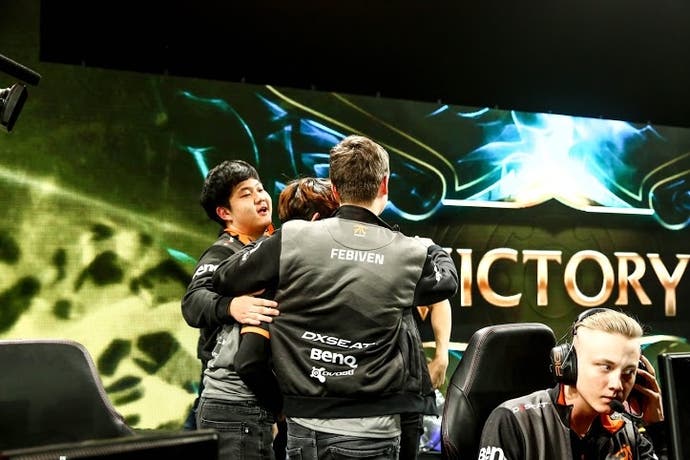
When Rekkles joined Fnatic's LCS lineup in 2014, it looked like he would be able to deliver on every promise and expectation as they won seven straight games to open the 2014 season. At one point, Rekkles' kill-death-assist ratio was 46 to 0. The streak, and the stratospheric stats that Rekkles was generating, suggest that Fnatic's ship had finally come in.
Despite his strong start, however, the game that Rekkles entered in 2014 was not the same one he had played so astonishingly well at the close of 2012. Rekkles made a name for himself at a time when one player could perform miracles. By 2014, that was no longer the case.
"[Back in Season 2], one role could solo-carry the game. If [a player] was mid or AD, they could literally solo-carry the game if they got rolling early on," Larsson recalled. "Now, stuff like this is impossible. It's really, really impossible for one player to kill five other players, or have so much of an impact on the game by himself."
“It's now impossible for one player to kill five other players, or have so much of an impact on the game by himself.”
Fnatic and Rekkles cooled-off as the 2014 season progressed, and their performance got more inconsistent. Fnatic fell into an old pattern of playing just well enough to stay on top of the European division. Their defeat in the summer season at the hands of Alliance, was followed by disaster at Worlds, where Fnatic did not even survive their group.
None of this was Larsson's fault. Unbeknownst to the Fnatic organization or Fnatic fans, the League of Legends team was on the cusp of breaking-apart. After years of playing together, the team's charter members, including captain Enrique 'xPeke' Cedeño Martínez, were simply tired of playing with the same people for the same organization. Martinez wanted to go start his own esports organization, and wanted to take some of Fnatic's top talent with him. Other players were considering quitting League of Legends entirely.
"I was aware of people's ambitions, and what they wanted to do in the future," Larsson said. "I didn't expect it to go down like it did, but I knew that people wanted to do different things and that potentially that would end with the team splitting apart. Because everyone couldn't fulfill their ambitions."
Larsson decided to seize the initiative. He tried to influence Fnatic's roster decisions for the upcoming year, and he opened negotiations with Fnatic's European rival, Alliance. As xPeke announced his own departure, and other Fnatic players joined him or retired, Rekkles looked like he'd just helped destroy a beloved institution. He ended up signing with Alliance and leaving Fnatic behind entirely.
Larsson looked ungrateful and mercenary. Worse, he didn't understand how drastically he'd just altered the public's perception of him.
"I think at that time I was maybe a bit immature, perhaps. [Not seeing] how the community worked ...the importance of the community," Larsson said. "I was kind of all about winning. Not saying that I'm not now, but back then, community stuff was never on my priority list. It was something I never paid attention to."
League has always had a strangely intimate atmosphere between its pro scene and its fandom. There is an informality around League that's really difficult to compare to anything else. Look at how Team SoloMid announced that they were signing Søren 'Bjergsen' Bjerg to be their new mid-lane player: with a terrible home movie skit. Recruiting Bjergsen was a powerful roster move akin to signing a new high-scoring forward in soccer or hockey, but League of Legends teams and players maintain a studied innocence towards the bottom-line.
Rekkles failed to play that game. By playing hardball with Fnatic, and then jumping ship in order to have a championship-calibre team around him, Rekkles seemed like he was putting himself first and betraying the team and fans that had looked after him since he was practically a child.
The weight
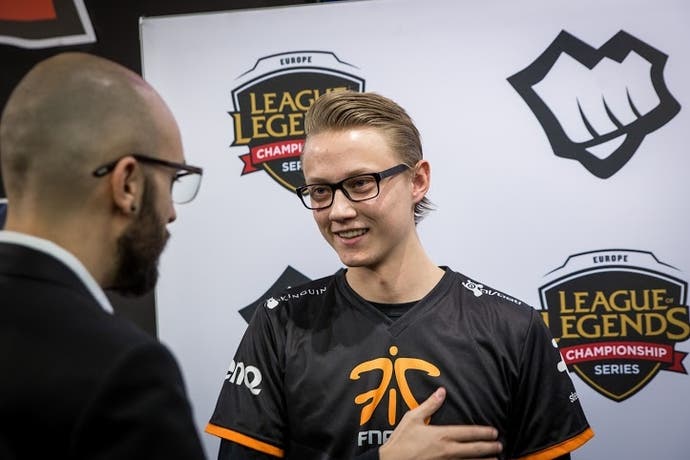
"Carry" is a unique word in League of Legends. It means a hundred different things depending on inflection and context. Larsson's position in-game is called AD Carry because, historically, those players controlled champions who "carried" the attack damage in the five-player squad, while other players and champions covered things like support abilities, burst damage, and tankiness.
Except "carry" implies other things. Good players are often expected to carry their teams. When a good player is undone by poor play from teammates, it's said that his team is too heavy to carry. When great players turn in a breakout performance and dominate a game, it's said that they are hyper-carrying.
That word has always attached itself to the role that Rekkles plays, even if the "carry" part of the AD position is increasingly downplayed. The position itself is flashy, and sets players up to look like geniuses when things are going well. Since League of Legends rewards players with gold and experience for getting kills, and AD characters need both resources to be at their most effective, the game itself encourages teams to let the AD land the killing blows.
"We all just wanted to focus on the game and improve as much as we could because even from the beginning, we were struggling.”
"If I were to compare it to something, maybe like a midfielder in football or soccer," Larsson said. "Maybe in one game. you're getting too pressured to be able to land those perfect deep passes for your forwards, sometimes as a midfielder you can't do that much because your forwards aren't performing, or your defenders aren't performing, but you're always there no matter what. I just feel like ADC is the same. You need setup, you need people around you to be able to perform. And once that is happening, maybe you will look much more clutch."
The AD tends to get a lot of credit for the rest of the team's work. But the reverse is also true: if an AD isn't carrying his team, everything that happens starts to look like his fault. Until he left Fnatic, Rekkles had only ever seen the positive side of that proposition. Now, with a new team for 2015, he was about to learn about the rest of the bargain.
Rekkles had seen a lot of potential in the Alliance team before he joined it. It was led by a veteran mid-lane player, Henrik 'Froggen' Hansen, whose talent made him a peer of Larsson's. They had finished the 2014 season looking very strong, stronger than Fnatic, in fact. They seemed like a place where Rekkles could thrive.
But the experience began to sour almost immediately. Shortly after Rekkles joined Alliance, Riot changed the ownership rules in LCS and forced Alliance to be spun-off into a new organization called Elements. Where Alliance had been part of a large and experienced eSports organization called Evil Geniuses, Elements was starting from scratch. Now, Rekkles found himself on a team with no infrastructure, where nobody had any experience in building it.
"We didn't have proper coaching staff for pretty much the whole split. We didn't have proper housing, a place to sleep, or a place to play, for the most part of the split as well," he said. "There were a lot of side things going on behind the curtains. Which we kind of couldn't have an impact on. And we all just wanted to focus on the game and improve as much as we could because even from the beginning, we were struggling, right?"
Few people really understood the upheaval behind the scenes, which is why Rekkles further cemented his reputation for being a selfish jerk when he answered a question on Ask.fm. Someone asked, "How are you enjoying your stay at Elements so far?"
Rekkles wrote, "I expected things to be better, both team-wise and organisation-wise, so I'm honestly a bit disappointed."
In League of Legends, where every effort is made to package pro players as good sports with relentlessly positive attitudes, Rekkles' bloodless realism looked like the height of prima donna arrogance. Yet from his perspective, he'd been giving fans what they wanted: honesty.
"I had no one to teach me how to treat social media things, or just social things in life in general." he said. "I kind of took the easy way out and went radio silent for a really long time. ...Just ignoring everything and just focusing on the game. After all, that's something I was at least good at. And maybe I wasn't good at handling my relationship with the community because, after all, that's not my job. You know?"
For people who want to find morality tales in sports, Rekkles' miserable spring was a feast of schadenfreude. As Rekkles and his new team floundered, the newly-rebuilt Fnatic squad was flourishing as it marched to the top of the standings. They were a better team now that Rekkles was gone, and Elements/Alliance looked worse than ever.
"It felt like once we solved one thing together - because everyone was willing to solve it, from players to management - there was another issue right around the corner. It was never-ending," Rekkles said.
"We had the constant pressure of playing in LCS on a weekly basis. It was so many things going on at once," Larsson said. "I can understand [how it led] to failure in hindsight. Because I couldn't handle it myself. To pick a number, there [were always]15 things that were wrong. But at the same time, you're 0-5 in the LCS, you have constant backlash from the community. And everyone just tried their heart out to keep ourselves in LCS."
The season took a toll on Larsson emotionally, too. As things continued to deteriorate at Elements, the full extent of his isolation became apparent. Things were tense with his old Fnatic teammates, who were the only people he'd ever really been close to in the pro scene. Yet having been a full-time League of Legends player since the age of sixteen also meant that he'd lost touch with most of his regular friends and family.
"When I left home when I was sixteen to play professionally, I lost a lot of friends. It was basically only me, talking to my family," he said. "[But] I was living in Berlin, and they were living in Sweden, and they're living their life, and I'm living mine."
Elements never became a good team, and struggled all the way to the end of the spring season. But they finished with a secure LCS slot for the summer season, which is better than what their mid-season nadir had promised. Despite the disappointment, it became an experience that Larsson treasured.
"I'm not really sure you can see it like this, but seeing the hard work pay off in some results where we ended up 7th and still kept ourselves in LCS, I was really proud of that," Rekkles said. "Probably more proud than getting 1st place or 2nd place last year. Because it just felt like I worked so hard and it paid-off. I don't know if that makes sense, because you should aim for higher, but it was hard to aim for higher [during] the spring split. Because we were already in the shit."
The quiet man
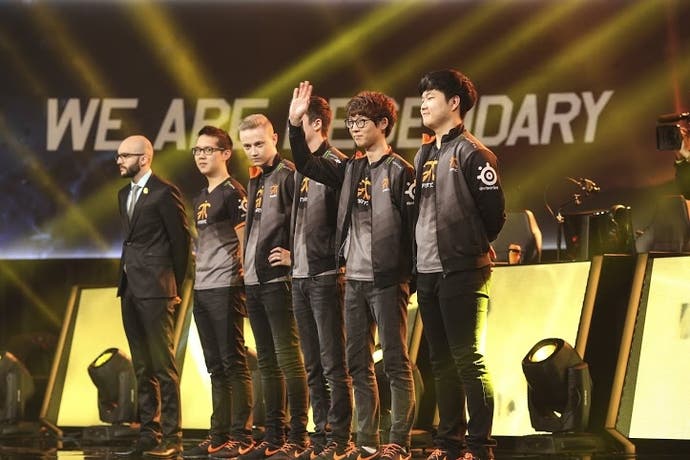
Even before the end of the spring season, Larsson was desperate to go 'home' to Fnatic. The team he'd left behind had thrived without him and were on their way to winning the spring season.
But his replacement at Fnatic, Pierre 'Steeelback' Medjaldi, was below the level of the rest of his teammates and was a competitive weakness for the team. Rekkles thought the door might be open for a return to Fnatic, and reached out to his old organization. By the time Fnatic competed at the Mid-Season Invitational this May, it was an open secret that Rekkles would be back with the team for the remainder of the 2015 season.
With his help, Fnatic won every single regular season game over the course of the summer, a first for any team in the LCS. On a record-setting Fnatic team competing in a Worlds semifinal, Larsson is in the midst of the most successful stretch of his pro career.
"I feel like there's other roles at this point in the game that carry the game much harder. I would describe it as some kind of background role. Which I'm perfectly comfortable with."
In a way, Rekkles has returned in triumph. He got everything he wanted: an elite team that took the game as seriously as he did. A chance at a world championship. A measure of independence from Fnatic, and proof that he can stand on his own even when things get dire.
The irony is that despite all these successes, Rekkles may never had had a lower-profile than he does right now. He didn't come back to Fnatic as a savior, the way he'd joined the pro team in 2014. He joined to provide an upgrade at a single position, to make an already great team even stronger. The fan-favorite at Fnatic is a Korean rookie, the cherubic Heo 'Huni' Seung Hoon, whose raw talent is matched only by adorable personality tics and an apparently bottomless well of enthusiasm.
Larsson, by contrast, is more aloof from the community. He's a reserved person to begin with, and the bruising experiences of the last year have made him even more wary. He's responded by becoming less invested in trying to get people to like him.
"That's probably the better choice for me. Because I know I can write good stuff. Or say good stuff. But I still feel like most of the people who disregarded me last year after I left the team will still disregard me after an essay or after a vlog or something, because they just want to see me live up to the hype," Larsson said. "So I just try to put all my focus into playing the game, and improving, and then performing on the stage."
He still delivers on that stage. During the European playoffs, he ran into his old team captain, xPeke, and his new team, Origen. They gave Fnatic its toughest fight since Rekkles rejoined the team, but in the climactic battle with a championship on the line, Rekkles pulled-off something you hardly ever see in a pro game: he got a Pentakill, in which one player single-handedly kills every member of the opposing team. It was a flash of the old Rekkles, of the old League of Legends, where you could believe that one talented kid could do everything you hoped and be everything everything you wanted.
But Rekkles has spent the last year learning his limits. He keeps a lower profile now, and he's no longer the Once and Future King of Fnatic, and he seems almost relieved that he no longer has to live up to the expectations he shouldered as a rookie. Just one series away from the World Championship Final, Rekkles has everything he wanted from the start: a winning team of like-minded talents, a chance at a world title, and freedom to focus on the game. If he's lost a bit of his star-power, well, that's just one less burden.
"Despite being called a carry. I feel like there's other roles at this point in the game that carry the game much harder. I would describe it as some kind of background role. Which I'm perfectly comfortable with," he said. "Because it allows me to do my job easier. I'm that person who doesn't take too many risks, but at the same time, I never really miss a play. So I'll always be there if it's needed, and ready to carry."
